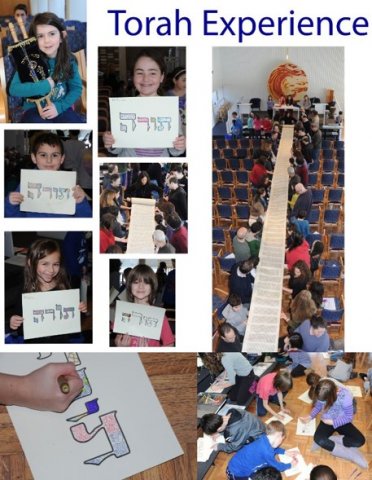Shabbat Centered Model: Shabbat School Experience
Reconstructionist Synagogue of the North Shore (RSNS) Plandome, NY
Model Description | Update 2017

Model Summary:
The Shabbat School Experience is an opt-in alternative family learning model for students in 1st-6th grades and their families. Students come together twice a month, once on a Friday evening and once on a Saturday morning to explore Torah through a number of different lenses including: technology, art, drama, teva (nature), and pop culture. Parents are asked to participate once a month on Saturday mornings. Students also attend Tuesday afternoon for Hebrew instruction and school community programs including Tefilla Breira (electives) in groups with the Tuesday/Thursday students.
Who are the Learners?
-
Learners are 1st-6th grade students and their families.
-
The ideal size of a cohort is less than 10 students per teacher/facilitator.
-
On Friday nights, learners are part of multi-age cohorts.
Who are the Educators/Learning Facilitators?
-
Teachers are called Morah plus first name.
- They are often synagogue members; some also teach in the pre-school and in the religious school during the week.
When Does the Learning Happen?
-
For students, learning happens on one Friday night and one Saturday morning per month.
-
For parents, it happens one Saturday a month.
Where Does the Learning Happen?
Learning happens in and around the synagogue building.
What is the Learning? How is it Designed?
-
Students come around 5:30 pm and eat a communal dinner on Friday evening, engage in music infused ritual, delve into ‘Torah through the Lens’ and then come back together and present their learning. Later, at 7:30 pm, families come to RSNS and join their children for the service. On Saturday morning children come and they have a worship experience with their families and then they go to classes by grade. Once a month on Shabbat morning, the parents learn with the clergy.
-
Learning is based on the weekly parashah (Torah portion) through the lenses of technology, art, drama, teva (nature), and pop culture.
-
On Friday night there is ‘Torah through the Lens of’ in multi-age cohorts where the teachers facilitate Torah learning through a lens that both they and their students have chosen.
-
Teachers design the learning according to a lens that they (the educator) have chosen because it is particularly compelling to them or in which they have some talent and expertise.
-
The students also get the opportunity to choose a lens through which they will engage in Torah study.
-
Students get to choose a new lens 4 times a year.
-
At the end of each session the whole group comes together and this is an opportunity for each “lens group” to present their experience as a reflection.
What Were You Trying to Achieve with this Model?
Students are given the opportunity to experience religious school through a variety of mediums and modalities that are specifically Shabbat centered. There is also a big emphasis on community as students have dinner together and engage in music infused rituals.
Key First Steps and Recruitment Plan:
-
Recruitment and successes are shared through word of mouth. Every religious school family learns about the possibility of joining the Shabbat School.
-
There are also videos that are shared widely with the congregation and the website also is a potent advertising tool.
Role of Governance and Clergy:
Rabbis and cantor are involved in all aspects of the model as they are teachers/facilitators fully integrated into this structure. The clergy lead the music and services, and support all aspects of these experiences.
Budget:
The budget was $14,000 for the school and $9,000 for personnel (staff salaries).
Hiring Needs:
Ideal educators are synagogue members who are familiar with the community and who are also creative and open-minded. They are collaborative team-members who enjoy working with both children and adults.
Relationship of Model to Congregational Learning System:
It is an equal option alternative to the traditional Hebrew school.
How Do You Describe Your Congregation?
Reconstructionist: 300 family units, 3 clergy, 20 educators; Educational Vision: RSNS is a warm, vibrant, egalitarian and caring Jewish community dedicated to improving our world through our commitment to ritual, spiritual growth, celebrations, social action, charity and ongoing learning.
Supplementary Materials Include:
